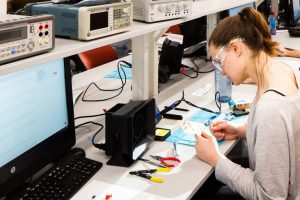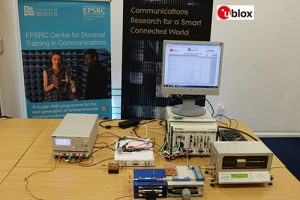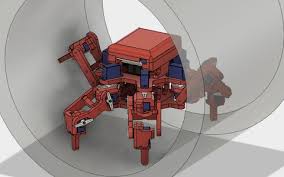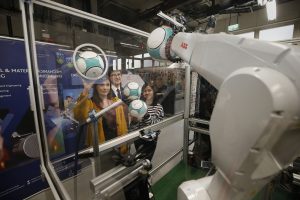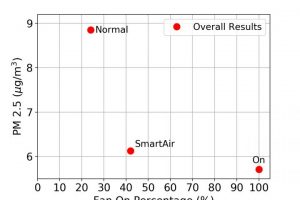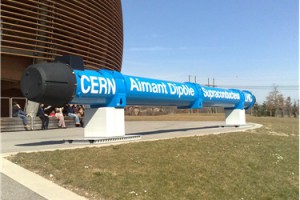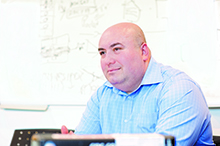Tektronix and Keithley Instruments have sponsored a university laboratory for London students Royal Holloway, University of London, has opened its Beatrice Shilling Building which includes teaching laboratories in partnership with Tektronix and Rapid Electronics. The building’s electronic engineering facility is home to these teaching and advanced research laboratories. Sponsor Tektronix says the laboratory enables instructors, lab managers and students to ...
University Electronics
The latest electronics news from UK universities
Novel front-end rejects RF self-interference for LTE
U-blox and University of Bristol have developed a tunable frequency-division duplexing RF front-end that combines passive and active self-interference cancellation. With the proof-of-concept demonstrator, an electrical-balance duplexer is used to passively cancel transmitter noise in the receive band, and an active canceller is employed to suppress self-interference in the transmit band. It has been characterised in duplex configurations working between ...
End to roadworks
The universities of Sheffield, Birmingham, Leeds and Bristol have received a government grant of £26.6 million to develop micro-robots (pictured) which will run through underground pipes to find and mend cracks. “While for now we can only dream of a world without roadworks disrupting our lives, these pipe-repairing robots herald the start of technology that could make that dream a ...
Shape-shifting antennae adapt in real time to cloak and block frequencies
Radio frequency filters can change which signals they block through a range of frequencies, using an origami-based structure to change their dimensions. Researchers at the Georgia Institute of Technology say that the tunable filters can be used in antenna systems that adapt to ambient conditions in real-time for electromagnetic cloaking systems that could be reconfigured on-the-fly to reflect or absorb different frequencies. Basing the ...
Conductive ink breakthrough reduces cost of graphene printed electronics
Researchers at the University of Manchester have identified dihydrolevogucosenone, a non toxic material which is less expensive than conventional conductive inks. It is a sustainable material that provides higher concentrations and conductivity compared with graphene ink and is lower in cost as it does not rely on metal nanoparticles for electrical conductivity in printed electronics. Printed conductive inks are being developed for transistors, sensors, antennae, ...
Putting the boot into Industry 4.0 education
Students in the School of Mechanical and Materials Engineering at University College Dublin can learn production technologies for Industry 4.0, or the smart factory, with hands-on experience via an automated factory demonstration unit, donated by Maxim Integrated Products. The football factory demo was popular at exhibitions around Europe, where it was used to showcase the principles of intelligent, automated production ...
US researchers turn to Raspberry Pi for clean air research
The University of Utah turned to Raspberry Pis when it need to equip four homes with smart sensing for clean air research. The Pis controlled the heating, ventilation, and air conditioning (HVAC) system in each house, based on data from three off-the-shelf wireless particulate pollution sensors added to each house, two inside rooms and one under cover outside. “With specialised ...
University of Cambridge researchers say machine learning is key to self-driving car
A Cambridge-based start-up believes machine learning software is the key to autonomous vehicles and Wayve is developing machine learning algorithms for autonomous vehicles. Wayve, which includes the chief scientist at Uber amongst its investors, believes the industry has been doing too much hand-engineering and too little machine learning. The firm is hiring for positions in its Cambridge-based headquarters. Wayve Co-Founder ...
UK scientists work on advanced accelerator at CERN
Engineers from the UK-based Cockcroft Institute claim to have made discoveries that could improve the design of next generation particle accelerators. Working closely with colleagues from around the world at CERN, the North West England based team has demonstrated that it is possible to create head-on collisions of proton beams using a crab-like motion. Work at the centre on plasma ...
Queen’s Belfast creates cyber security lab for local community
Queen’s University Belfast is investing £500k in a cyber security research lab at the Centre for Secure Information Technologies (CSIT). An aim of the facility is to work with global companies, start-ups and SMEs to form a strong response to cyber security attacks. The CSIT Test lab includes a high-speed network interconnected via a multi-gigabit optical fibre to the public ...
 Electronics Weekly Electronics Design & Components Tech News
Electronics Weekly Electronics Design & Components Tech News
